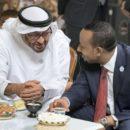New (and Different) Hostilities in Darfur
The last few weeks have seen the first significant armed hostilities between the Sudan government and rebel forces since October 2006. What is the significance of this?
The latest round of fighting began with a joint JEM/SLA-Unity military operation in Adila, south-east Darfur, which was followed by a rebel incursion into Kordofan and an army/airforce attack on Haskanita in eastern Darfur.
Salient points to note are:
1. This is the first significant fighting between the army and rebels since two army offensives were defeated in North Darfur in September and October 2006. But none of these battles are comparable in size to the hostilities that raged during the period February 2003-January 2005, or indeed on numerous occasions in Southern Sudan.
2. The fighting was initiated by the rebels. It was provocative, even reckless, and there has since been internal disagreement among rebel commanders over the wisdom of launching these raids, which began in a historically Arab part of Darfur and then crossed the boundary into Kordofan.
3. The government response has relied on the army and airforce and not the militia. In Adila, following government warnings that it intended to attack the town, most residents fled and there were few civilian casualties. The aim of the attack on Haskanita may have been to try to kill the rebel leaders who had assembled there with their forces. In this case, civilian casualties were higher. It is not clear whether Khartoum’s decision to use the regular armed forces and not militia was taken for internal operational reasons or because of international criticism over the abuses that invariably accompany militia actions.
4. Despite the army’s use of MiG fighter-bombers, helicopter gunships and other heavy weaponry, the rebels got the better of the army. Four and a half years since the outbreak of major hostilities, the Sudan army is still not capable of operating effectively against an enemy that uses mobile desert warfare tactics. In response to a series of defeats in 2003, the army turned to using the militia, and if the rebel attacks escalate, it will be tempted to abandon conventional military tactics and resort to militia-based counterinsurgency again.






I saw this article in the New York Times and thought it could help put the recent violence into context.
The brief article, dated October 6, reports on the concerns of the US envoy to Sudan: Andrew S. Natsios. It quotes him describing the relations between the North and South as “poisonous” as well as his concern that a deterioration of the CPA will negatively impact the conflict in Darfur.
Natsios also indicated that he expects that the recent surge of violence in Darfur is not surprising considering that the peace talks in Libya will occur in the near future:
“He said the Darfur conflict, which has killed at least 200,000 people according to the United Nations, was "temporarily intensifying" because people are trying to position themselves before peace talks in Libya on Oct. 27.”
Alex, as someone who has participated in similar peace talks, can you speak to the ability of the process to weed out illegitimate or insignificant rebel groups and focus on peacebuilding between Khartoum and the legitimate representatives of the people of Darfur?